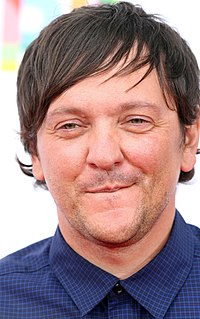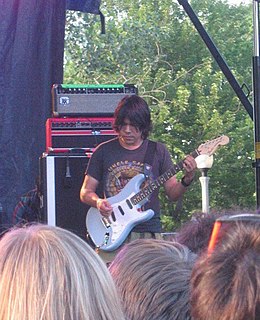A Quote by Kevin Keck
As a writer, I was deliberately creating an alternate world, and then populating it with experiences and people that I knew in this world, but I'd shake up the mix considerably. And about the same time that the memoir was becoming the dominant popular literary form in the mid to late 90s, I started reading writers who were deliberately playing with the notion of "truth" and "fiction" - that struck me as a much more interesting way to tell certain stories, particularly in the realm of comedy.
Quote Topics
About
Alternate
Becoming
Certain
Comedy
Creating
Deliberately
Dominant
Experiences
Fiction
Form
Interesting
Knew
Late
Literary
Me
Memoir
Mid
Mix
More
Much
Notion
Particularly
People
Playing
Popular
Reading
Realm
Same
Same Time
Shake
Started
Started Reading
Stories
Struck
Tell
Then
This World
Time
Truth
Up
Way
Were
World
Writer
Writers
Related Quotes
I'm afraid that - not necessarily deliberately, but consistently - I've made a kind of laboratory out of my life, where I mix the stuff in the test tubes to create explosions - possibly resulting in interesting by-products. I mean, not deliberately - I'd be crazy to deliberately do that - or maybe not.
I started doing comedy just as myself, because I thought, "This is what's expected, you're meant to tell stories and do observations." And then I started to realize that I wanted to mix it up a bit, so I started to doing songs, and I had a little keyboard onstage and would bring in little props. Then I thought about the idea of talking about a character and becoming the character onstage. So, it sort of morphed into being stand-up that was more character based, and I found that's the stuff I got the better reaction from and was more exciting for me.
The fiction I've written and published is certainly inflected by the work of authors I was reading or translating at the time. One of my methods for developing my own voice in fiction, a process I am taking very slowly and deliberately, is through these very intense encounters with certain writers. Strength and power in fiction is being able to resist these intoxicating voices, recognizing that they are the signatures of other writers and not one's own.
What writers of fantasy, science fiction, and much historical fiction do for a living is different from what writers of so-called literary or other kinds of fiction do. The name of the game in F/SF/HF is creating fictional worlds and then telling particular stories set in those worlds. If you're doing it right, then the reader, coming to the end of the story, will say, "Hey, wait a minute, there are so many other stories that could be told in this universe!" And that's how we get the sprawling, coherent fictional universes that fandom is all about.
When I was writing the memoir, every page was a battle with myself because I knew I had to tell the truth. That's what the memoir form demands. I also had to figure out how much of the truth do I tell, how do I make the truth as balanced as I possibly can? How do I make these people as complicated and as human and as unique and as multifaceted as I possibly can? For me, that was the way I attempted to counteract some of that criticism.
I've always loved short stories. Even before I was a writer I was reading short stories - there were certain writers where I just felt like they could do in a short story what so many writers needed a whole novel to do, and that was really inspiring to me. Alice Munro, I felt that way about from an early time. Grace Paley.
If I have to reduce all of the laws of war into a single sentence, it is this. You divide the world into two, combatants and noncombatants. You can attack deliberately combatants, but not deliberately noncombatants. Israel acts that way. It attacks combatants and accidentally kills noncombatants. But in the case of the terrorists, it's the exact opposite. They deliberately attack combatants - noncombatants, civilians, deliberately.
I changed my writing style deliberately. My first two novels were written in a very self-consciously literary way. After I embraced gay subject matter, which was then new, I didn't want to stand in its way. I wanted to make the style as transparent as possible so I could get on with it and tell the story, which was inherently interesting.
Writers imagine that they cull stories from the world. I'm beginning to believe that vanity makes them think so. That it's actually the other way around. Stories cull writers from the world. Stories reveal themselves to us. The public narrative, the private narrative - they colonize us. They commission us. They insist on being told. Fiction and nonfiction are only different techniques of story telling. For reasons that I don't fully understand, fiction dances out of me, and nonfiction is wrenched out by the aching, broken world I wake up to every morning.
I read somewhere once that in the 1960s, fiction writers were troubled by the notion that life was becoming stranger and more sensational than made-up stories could ever hope to be. Our new problem - more profound, I think - is that life no longer resembles a story. Events intersect but don't progress. People interact but don't make contact.
































